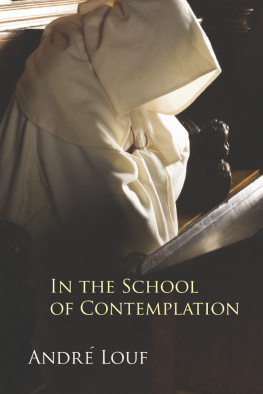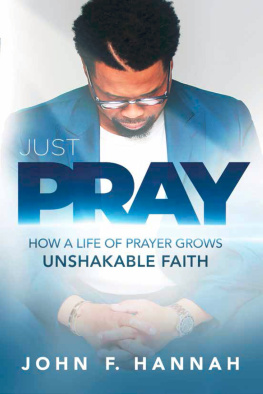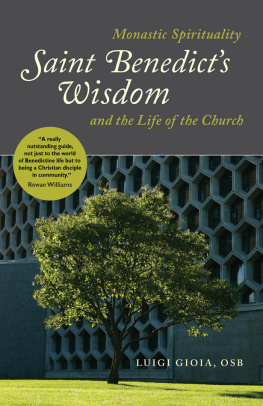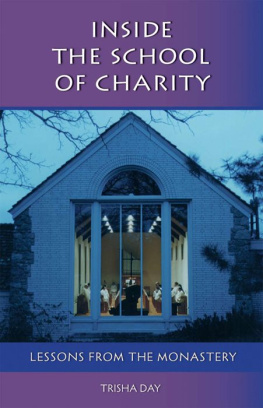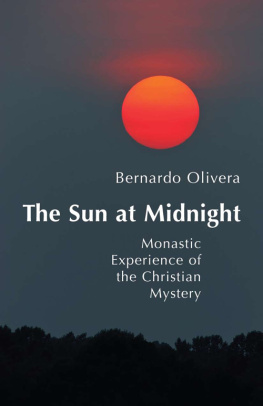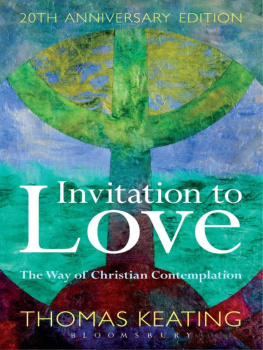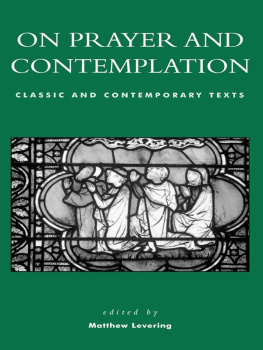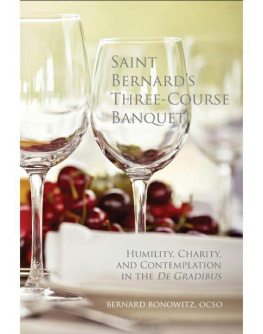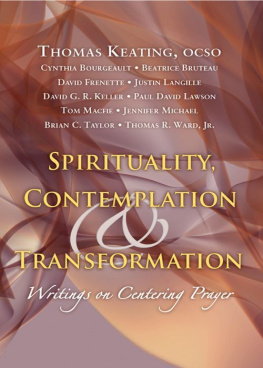MONASTIC WISDOM SERIES
Simeon Leiva, OCSO, General Editor
| Advisory Board |
| Michael Casey, OCSO | Terrence Kardong, OSB |
| Lawrence S. Cunningham | Kathleen Norris |
| Patrick Hart, OCSO | Miriam Pollard, OCSO |
| Robert Heller | Bonnie Thurston |
A Cistercian Publications title published by Liturgical Press
Cistercian Publications
Editorial Offices
161 Grosvenor Street
Athens, Ohio 54701
www.cistercianpublications.org
This work was originally published in French as A LEcole de la Contemplation, Lethielleux 2004.
Excerpts from documents of the Second Vatican Council are from Vatican Council II: Constitutions, Decrees, Declarations; The Basic Sixteen Documents, edited by Austin Flannery, OP, 1996. Used with permission of Liturgical Press, Collegeville, Minnesota.
Unless otherwise indicated, Scripture texts in this work are translated from the French edition.
2015 by Order of Saint Benedict, Collegeville, Minnesota. All rights reserved. No part of this book may be reproduced in any form, by print, microfilm, microfiche, mechanical recording, photocopying, translation, or any other means, known or yet unknown, for any purpose except brief quotations in reviews, without the previous written permission of Liturgical Press, Saint Johns Abbey, PO Box 7500, Collegeville, Minnesota 56321-7500. Printed in the United States of America.
The Library of Congress has cataloged the printed edition as follows:
Library of Congress Cataloging-in-Publication Data
Louf, Andr.
[Works. Selections. English]
In the school of contemplation / by Andre Louf, OCSO ; translated by Paul Rowe, OCSO.
pages cm. (Monastic wisdom series ; number forty-eight)
Compilation of works originally presented in various languages.
This work was originally published in French as A LEcole de la Contemplation, Lethielleux 2004.
Includes bibliographical references.
ISBN 978-0-87907-147-9 ISBN 978-0-87907-487-6 (ebook)
1. Monastic and religious life. 2. Spiritual lifeCatholic Church. I. Rowe, Paul, 1971
BX2435.L68 2015
248.8'94dc23
2015003759
Contents
Foreword
Andr Louf (19292010) was abbot of the Trappist-Cistercian monastery of Mont-des-Cats in the north of France from 1963 to 1997. He was one of those personalities whose light shines beyond the limited milieu of their own vocations. His books have fed the spiritual lives of numerous Christians, in monasteries and beyond. There was doubtless at work in him something of the same mysterious action of the Spirit already identified, in the distant past, by the Desert Fathers. This is a phenomenon explicitly mentioned on several occasions by Andr Louf himself when he was questioned about the particular fruitfulness of monastic life.
For many years, Andr Louf maintained a solid fraternal relationship with the young monastic community of Bose in northern Italy, founded by Enzo Bianchi. Bose had the excellent idea to collect in a single book, published by their Qiqajon Editions, a series of texts by Louf that had previously appeared scattered in various journals (Collectanea Cisterciensia, Cistercian Studies, Christus, Vie consacre, Les Amis des monastres) between 1969 and 1996. These texts include a number of presentations by Andr Louf at certain monastic meetings, which explains the oral style that has been preserved, as well as the reiteration of certain thoughts and anecdotes from one text to another, the better to clarify the subject at hand. The texts do more than paint a panorama of different aspects of monastic life: they shed light on the deep journey of all monastics and, really, of every authentic seeker after God.
Andr Louf speaks, with good reason, of different forms of complicity between the contemplative life and certain challenges addressed to the Church. With its singular focus, the monastic experience concentrates within itself the deep movements of the life of the Spirit that are found in every human being docile to them. Its intensity enables one to better understand, by means of this experience, what takes place in the encounter of a human being with the Father and the Son. In this sense, everyone can read the first chapters of this book that focus on the common life and obedience in the monastery and find there much to nourish his or her own reflections. One will find there that the so-called desert, about which Louf has some striking pages, exceeds the literal framework of the monastery and deeply affects every religious and indeed every human experience. Moreover, if one is willing to be attentive, the desert can open one out to the whole world.
Here the question of ecumenism naturally arises, especially its link with monastic tradition as understood by Eastern Orthodoxy. It is precisely when we plumb the depths of the Christian mystery that authentic dialogue can take place with all the delicacy, attentiveness, charity, and humility that it demands. In this connection, the account that Andr Louf gives here of a pilgrimage to Mount Athos and some monasteries in Romania is very expressive.
Finally, the book comes to its completion by way of a return to the center of the monastic experience, through the liturgy. One could easily read and reread the beautiful meditation on the Psalms as a true introduction to praise, as an invitation to enter into the poetic and creative action by which the Spirit releases all the potentialities of human speech in the one who prays. Likewise, by revisiting the tradition in this way, Louf introduces his reader into the dynamism that is at the heart of the liturgy and yet carries the liturgy beyond itself: the dynamism that is the work of Gods Word.
But this work manifests itself only to someone who gazes upon Gods Word with love. And so the book concludes by making this point through a brief contemplation of the mystery of Jesus death and resurrection. And here, at the end, we find again what had been underscored by the texts on the common life in the beginning: namely, that the Word of the Father, which the Son makes known to us by giving us his life, is in its entirety a gift of mercy, that is to say, a gift of love springing up from the very depths of God.
Jean-Franois Bouthors
(French edition)
1
Spiritual Experience
How is the life of the Spirit manifested in us, and what criteria do we have for discerning his presence and identifying our experience of him?
You will all agree that this is an important and urgent task in the Church of today. We are being given a lot of new criteria to apply to our spiritual experienceor at least, criteria that are applicable to human experience in generalpsychological, sociological, religious (using the word in a restricted sense), and even aesthetic.
The great temptation, the great confusion that threatens us here, is that of being satisfied with these attempts and in the end raising to the status of absolute norms and adequate criteria things that only skim the surface of our experience of the Spirit. What we should be engaging in, on the contrary, is a ceaseless effort of confrontation between the light that is in us from the Holy Spirit and the light that comes from profane reflection. It is an effort to meet the adversary and to join battle, and it is the special task of theologians.
We notice nowadays that Christians and even religious are becoming more and more insensitive to the specifically spiritual domain and incapable of truly discerning it. This insensitivity is partly due to the fact that Christians, inadvertently perhaps, are putting their hope in this arsenal of new criteria now at their disposal. On the whole, we in the West are ill-equipped to express our experience of the Spirit even to ourselves, and it is perhaps a good thing that we are only just beginning to try.

